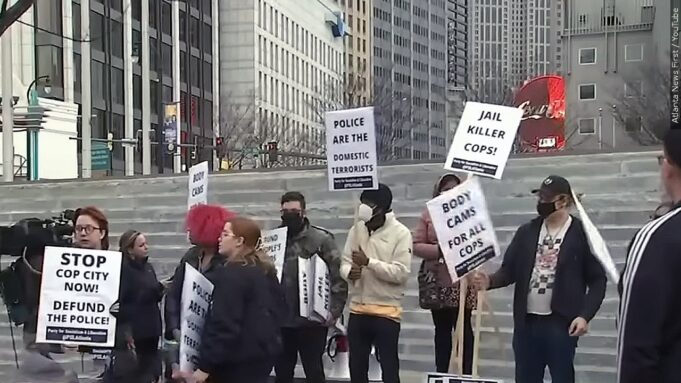ATLANTA—Public Enemy’s “Fight The Power” and N.W.A.’s iconic anti-police abuse anthem blasted in a room at The Gathering Spot in Atlanta, kicking off a Stop Cop City photoshoot and town hall themed, “From Red Dogs to COP CITY: Dirty South’s History of Over-policing Atlanta.”
The event, hosted by Hip Hop Caucus, took place on June 30 with the goal to “invite people to join the STOP COP CITY movement” and to “secure qualified signatures from residents to add a Cop City referendum to the ballot for the 2023 election.”
Activists, protesters, and organizers of the Stop Cop City movement are attempting to collect over 70,000 signatures by August 15, the deadline to add the referendum. Organizations in support of the town hall event included Community Movement Builders, Movement for Black Lives, Until Freedom, and SONG Power. Black and Indigenous activist YoNasDa LoneWolf was also in support.
“We’re here in support of the many coalitions and Atlantans who for two years have said they did not want Cop City to be built,” Brandi Williams, good trouble and field campaigns director for Hip Hop Caucus, said to The Final Call.
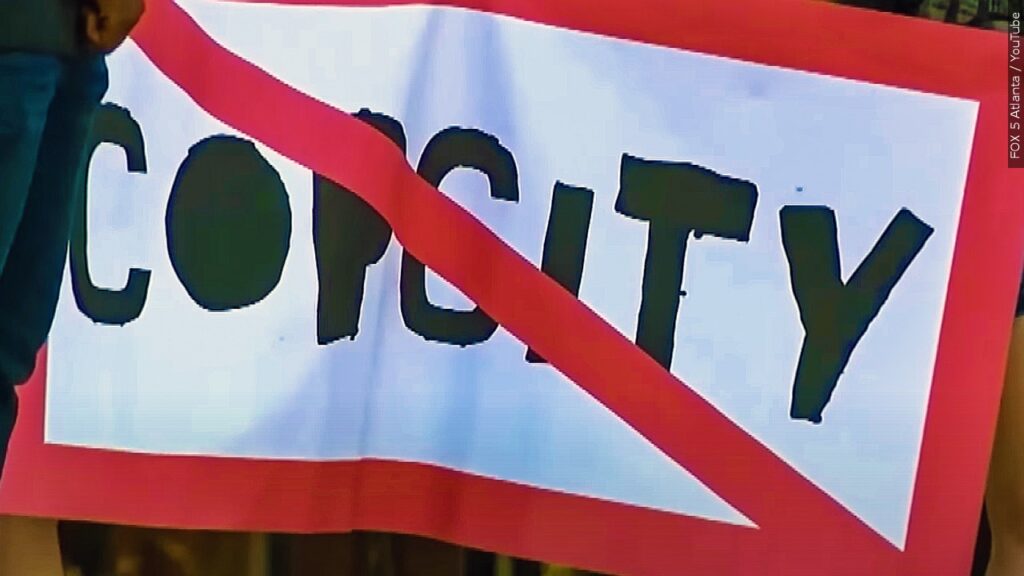
“What we found is that there is a disconnect between Black Atlantans about what’s actually happening, why it’s important, and why this particular facility is not something that needs to be built and to seek their support for the referendum. Because now what we’re trying to do is get the city of Atlanta to put on the November ballot a referendum so the people can vote and decide if Cop City should be built, since the people they elected could not do what they wanted,” she added.
What is Cop City?
What has been dubbed “Cop City” by critics is a $90 million dollar “public safety training center” for police, firefighters, and emergency medical technicians (EMTs) owned by the City of Atlanta and leased to the Atlanta Police Foundation, a nonprofit organization that supports the Atlanta Police Department.
According to the foundation’s website, the center will improve morale, retention, recruitment, and training for Atlanta police and firefighters; set a national standard for community engagement, neighborhood sensitivity, and devotion to the civil rights of all citizens by law enforcement; embrace police reform and cultural sensitivity and facilitate collaboration and joint training between Atlanta’s police and fire/rescue agencies and their local, state and federal partner agencies.
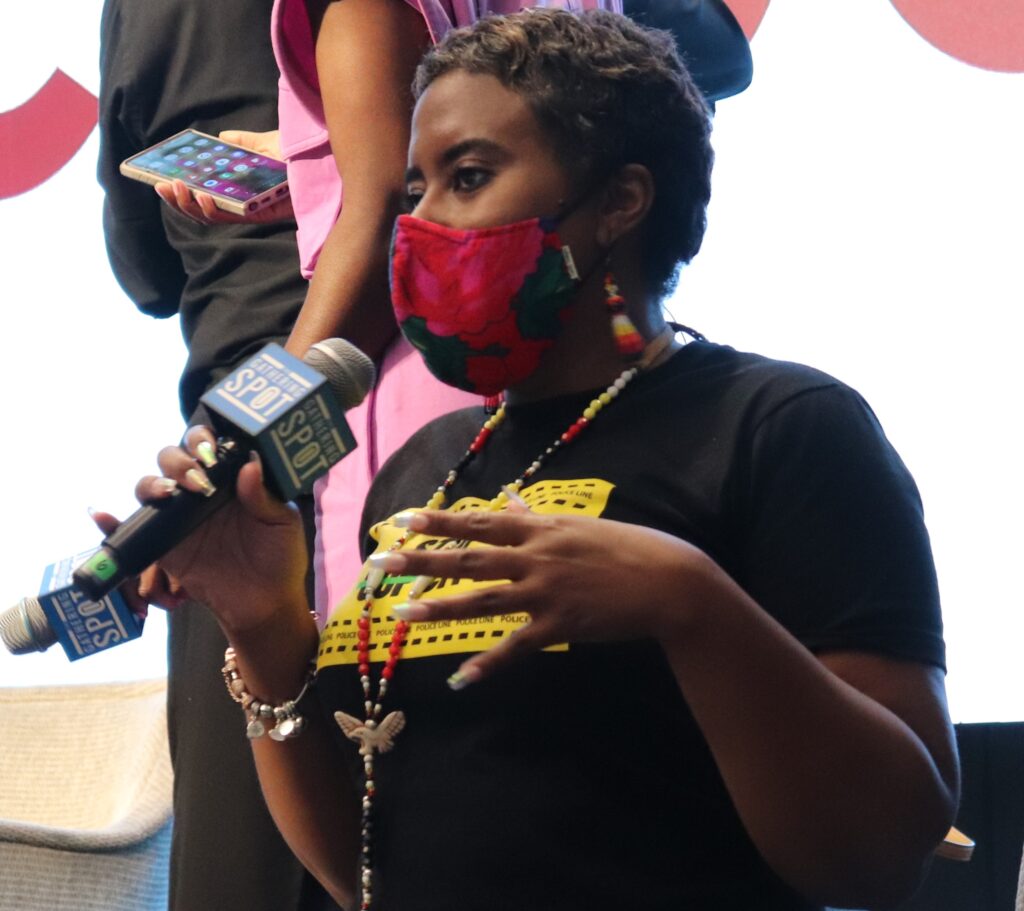
The center will include an emergency vehicle operations course, a training and education center, a leadership institute, a firing range, a fitness center, stables and pastureland, a canine training center with kennels, a training fire station, a burn building and a mock village.
The center will be located in the South River Forest in southeast Atlanta and DeKalb County. Historically, the forest, then called “Weelaunee Forest,” was inhabited by the Muscogee Creeks before they were forcibly removed by White people in the 1820s to 1830s. Afterward, a White man named George Key established a slave plantation on the land.
He owned at least 19 slaves. The land was purchased by the city of Atlanta in 1918 to be used as a prison farm, which operated from the 1920s to 1995. The land continued to be used by the city as a firing range for the Atlanta Police Department.
The city of Atlanta owns over 380 acres of land in the area where the training center is being built.
The Atlanta Police Foundation set its sights on the land as potential for a training facility as early as 2017, when it proposed its “Vision Safe Atlanta – Public Safety Action Plan.” It originally marked 160 acres for recommended use, using other facilities as a reference point, such as Charlotte-Mecklenburg’s 108,000-square-feet (2.48-acre) Police and Fire Training Academy, Charlotte-Mecklenburg’s 26-acre emergency vehicle operations course and Michigan’s 42-acre emergency vehicle operations course. The foundation settled on 150 acres.
The city of Atlanta granted approval to the foundation in September 2021 after reducing the acreage from 150 to 85 in August of that year.
Opposition to the project has sparked numerous protests, some of which have escalated into violence, including the fatal shooting of 26-year-old environmental activist Manuel Paez Teran in January. Numerous protesters have also been arrested.
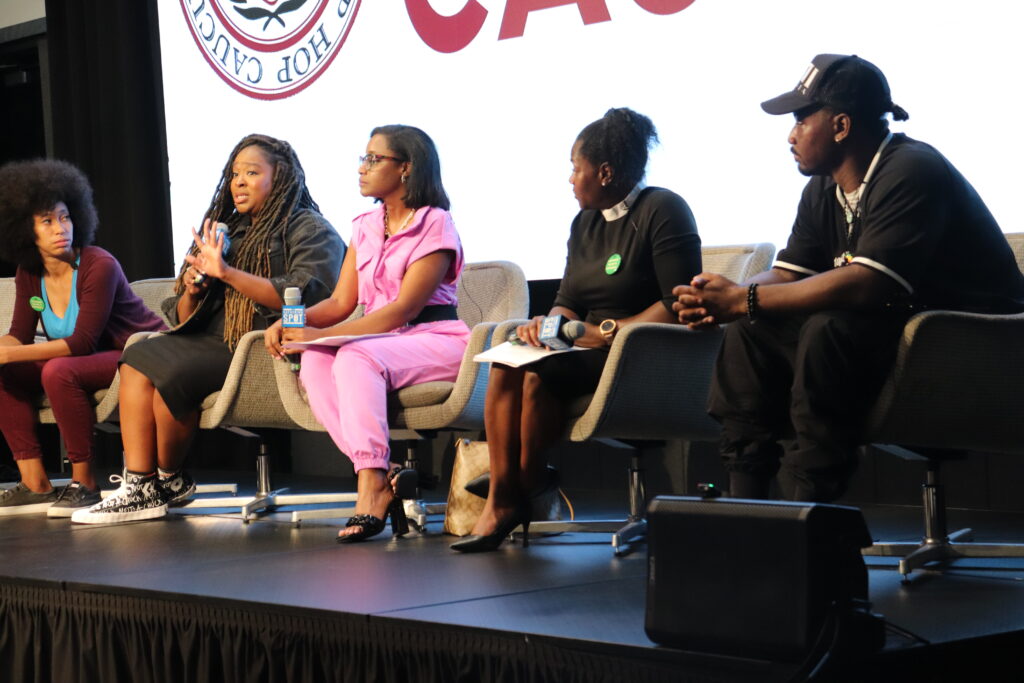
On June 6 of this year, one day after hearing almost 14 hours of complaints and arguments against the training facility by Atlanta residents, the City Council voted in favor of allocating $31 million in public funds to the center’s construction and $36 million over the span of 30 years for using the facility. Taxpayers would be paying a total of $67 million.
As for the other portion of the $90 million, the Atlanta Police Foundation is backed by the Robert W. Woodruff Foundation, which funds several colleges in Atlanta, the James M. Cox Foundation, an arm of Cox Enterprises, and big-name entities such as Delta Air Lines, Waffle House, The Home Depot, Wells Fargo, Coca-Cola, UPS, Bank of America, Equifax and Chick-fil-A.
“I remember I put a post on Facebook, I was like, ‘I’m sick of getting these emails from these companies saying Black Lives Matter. If it really matters, do something about it. Don’t just send me this empty email,’” Ms. Williams recalled.
Environmental concerns
For the past two years, activists have opposed the training center due to environmental and police militarization concerns.
“They’re building it in a Black community in DeKalb County, and it’s down the street from McNair (Senior) High School, but they’re also tearing down one of the nation’s largest forests to do this,” Ms. Williams said.
“That will cause local pollution and continue to cause environmental concerns for the Black residents in that community. Also, noise pollution from the shooting range,” she continued.
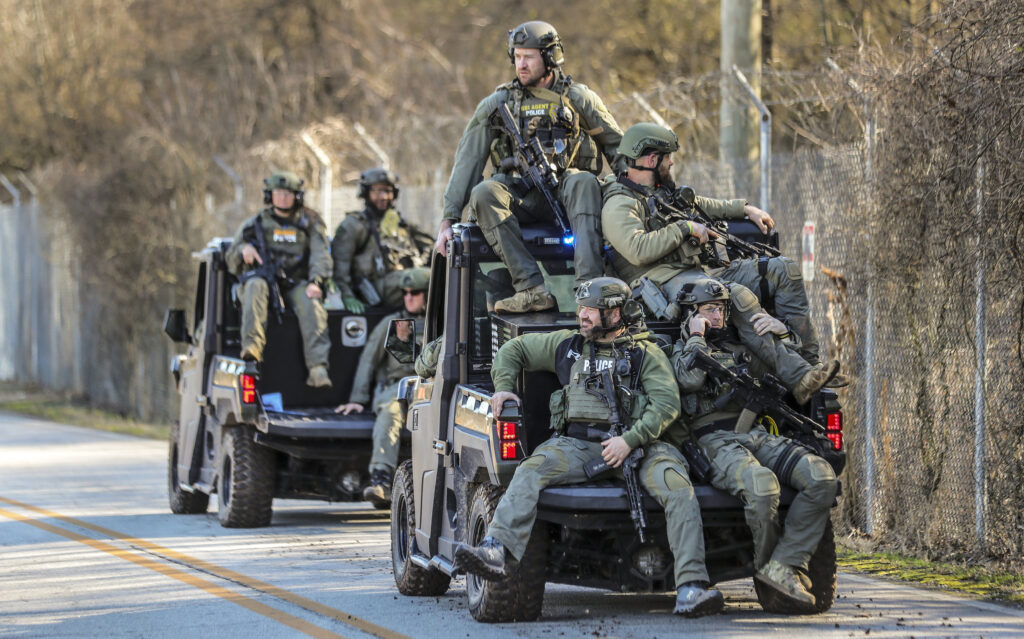
She also criticized what she called “the militarization curriculum” used to train police officers.
“They’re planning to host police officers from around the country. So, this has national implications. It’s not just about Atlanta and Atlanta police. It’s about what could potentially show up in Black communities across the country. Your police officers come to get trained on how to be war soldiers in your community. They’re teaching them military tactics and how to be soldiers in a domestic environment with our people, only our people,” she said.
DeKalb County is majority Black. Blacks make up about 55 percent of the population and Whites around 36 percent, according to the U.S. Census Bureau.
The Atlanta Police Foundation has called some of the concerns “myths.” On its website, and on the training center’s website, it says most of the 85 acres have already been clear-cut several times over the past century and that the rest of the acreage would be used as publicly accessible, protected greenspace.
The foundation has also committed to “replace any hardwood tree destroyed in construction with 100 new hardwoods, as well as replace any invasive species trees with new hardwood plantings.” It maintains that a “100-foot tree buffer will be preserved between the Training Center site and residential neighborhoods” and that work is being done to minimize noise from the firing range.
The Atlanta Police Foundation’s environmental assurances come after DeKalb County has already experienced years of poor air quality. The American Lung Association’s 2023 “State of the Air” report graded DeKalb County a D for “high ozone days,” with five orange ozone days and one red ozone day.
In its 2018 and 2019 reports, the county was graded F. The report described ozone pollution, often called smog, as unhealthy, leaving a sunburn on the lungs and leaving people suffering from shortness of breath, coughing, asthma attacks and sometimes early death. Its 2022 report ranked Atlanta as having the “fourth poorest air quality in the southeast.”
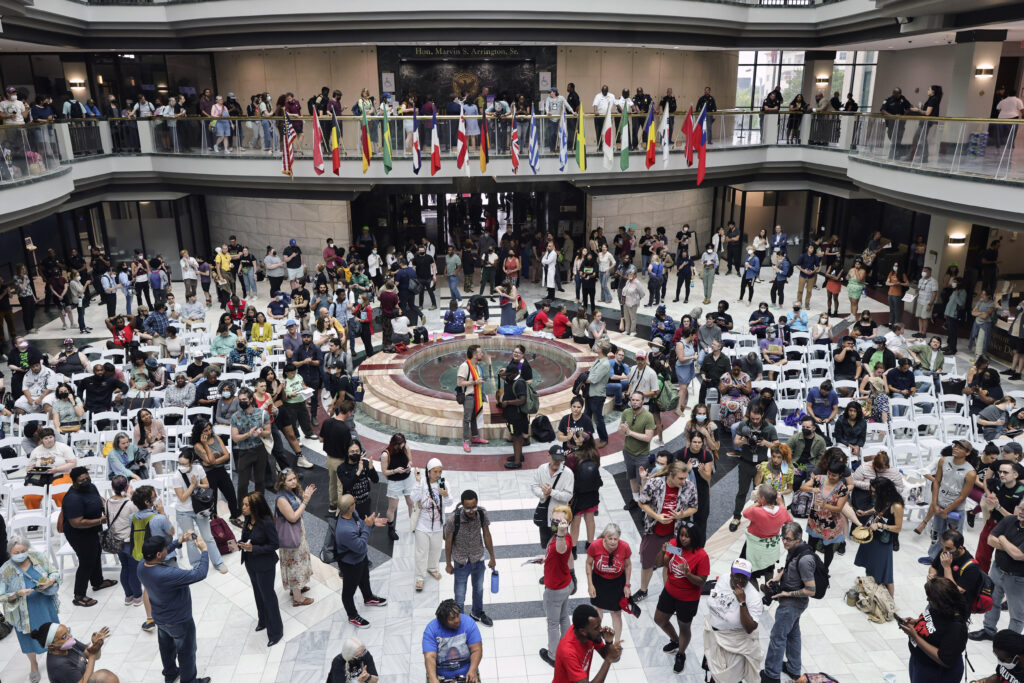
Healthline analyzed data from the American Lung Association from 2000-2016 and ranked two counties in the Atlanta metro area, Fulton County and Clayton County, as 6th and 10th, respectively, among the 10 worst U.S. counties for air pollution.
On the day of the Stop Cop City photoshoot and town hall, smog blanketed the air of Atlanta as a result of the fires in Canada, causing poor air quality in the city. “Anyone else having a hard time breathing today?” Dr. Mariah Parker, a panelist at the town hall event, questioned. “Without the lungs of Atlanta, big tree canopies like those in the South River Forest, what do you think will happen in the city of Atlanta?”
She described Cop City as “a main driver of environmental racism to come for our children who are going to grow up with asthma, who are going to grow up having a lot of different health conditions, because of a lack of healthy air to breathe and clean water to drink.”
Hardwood trees can take a minimum of 10 years to reach maturity, and sometimes up to 40 years or more depending on the type of tree and the location. One Black Atlanta resident’s concern regarding the construction of the training facility was the possible tearing down of adult trees only to replace them with baby trees that would take time to mature to the point of providing the same amount of oxygen as an adult tree.
Moving forward
Ms. Williams described some of the hoops and hurdles organizers with the Stop Cop City movement have come across, in obtaining over 70,000 signatures for the referendum: one, in order for a person to sign the petition, they have to live in Atlanta proper, and not in any of the cities surrounding Atlanta, such as Decatur or College Park; two, they have to have voted in the 2021 municipal election; three, the signature has to be witnessed by and validated by an Atlanta resident who is a registered voter and four, the petition has to be signed in Atlanta proper.
“So, let’s say I see my homegirl, we both live in the actual city of Atlanta. Let’s say we live down in Buckhead, but we happen to be out at a festival in Decatur. I can’t get her to sign that in Decatur. She has to sign it in the city of Atlanta limits,” Ms. Williams said.
Amid collecting signatures, organizers are also boycotting the companies that help fund the Atlanta Police Foundation and its initiatives.
“We’re not flying Delta right now. We’re not drinking Coca-Cola or any of these products. We’re not eating at the Waffle House. We’re not buying things from Home Depot,” Ms. Williams said. “There are ways for us to hold them accountable. If we think back to the history of the civil rights movement, we have a plan. We know how to do this. We just have to have the strength to do it.
“One thing that I always ask people: how much are you willing to sacrifice to save your life?” she questioned. “And I think this is the moment in time that we need to be thinking about what sacrifice means for us and for future generations because if the people before us did not do it, we would not be here.”
For more information on the #StopCopCity movement, text cop city to 79591.












